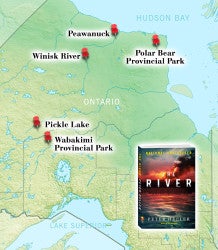Reading Group Center
- Home •
- Books by Category •
- Imprints •
- News •
- Videos •
- Media Center •
- Reading Group Center
Armchair Adventurer: Ontario’s Isolated Wilderness in The River
In Peter Heller’s latest novel, The River, best friends Wynn and Jack embark on a backcountry canoe trip on the Maskwa River from Moose Lake into Hudson Bay. Heller’s descriptions of nature, canoeing, fishing, and the daily life of wilderness adventuring are so realistic, that we were inspired to set off an adventure of our own, an armchair adventure that is—we have neither the paddling prowess nor the survival skills necessary to attempt such a feat in real life. When Heller shared with us that the Maskwa River of the novel is actually the Winisk River and that he based the Cree village of Wapahk on the village of Peawanuck, we couldn’t resist exploring this wild and largely inaccessible region of Ontario, Canada.
Winisk River and Provincial Park
The Winisk River is a 295-mile long river that flows from Wunnummin Lake to Hudson Bay in northern Ontario. Looking at a map, it may be difficult to follow the river from its origin to Winisk Lake because of all the small lakes and waterways crowding the area, but from Winisk Lake to Hudson Bay the path becomes clearer. The river travels through Winisk River Provincial Park, over the Canadian Shield, past the village of Peawanuck, and through an outcropping of Polar Bear Provincial Park. Winisk Provincial Park is a nonoperating park, meaning there are no facilities and you should not attempt to visit unless you are experienced in wilderness survival and white-water paddling.
Peawanuck
The Cree who live in the village of Peawanuck relocated there in 1986 after the village of Winisk—nineteen miles closer to Hudson Bay—was destroyed by a flood that sent walls of ice through the town. The community of just over two hundred people is accessible by air and is the base for a tourism industry offering fishing and canoe excursions. Visitors also fly into the small village to try to spot polar bears from an observation tower. If you aren’t calling back to Pickle Lake for a pickup, Peawanuck is where you would end your journey on the Winisk.
Polar Bear Provincial Park
Peawanuck is located next to Polar Bear Provincial Park, which is home to many types of wildlife, including beluga whales, moose, beavers, and various species of birds. Of course, the park is also home to polar bears—sometimes up to two hundred. In addition to the flourishing wildlife, there are beautiful flowers, scrub, and colorful ponds. The park, the largest in Ontario, is only accessible by plane from one of its four airstrips. Any visitors must be ready to rough it. There are no amenities and the weather can be harsh—the park’s website warns to pack an extra week’s worth of provisions in case you get stuck there because of a storm—but those brave and outdoor-savvy enough to travel there will be rewarded by breathtaking views.
Pickle Lake
The few people who canoe on the Winisk River tend to start their journey at Pickle Lake, which is mentioned several times in The River. Located “at the end of the road,” it is truly a place to get away from everything. There are a few accommodations and campsites in town, but mostly people use it as a jumping off point for their adventures. Even those who are not experienced outdoors people—those who like a hot shower and a bed at the end of the day and aren’t world-class canoers—can find somewhere to explore in the area, especially with the help of an outfitter.
Wabakimi Provincial Park
For those who aren’t quite ready for something as intense as braving the Winisk river, there’s Wabakimi Provincial Park. Although still pretty bare bones, it is less remote—accessible by canoe, train, or plane—and has designated campsites and maintained portage trails. It offers over one hundred miles of world-class waterways for canoers on both lakes and rivers so you can choose a peaceful, slow paddle or a heart-stopping white-water challenge. Like the rest of the area, Wabakimi Provincial Park is perfect for fishing. Visitors look to catch trophy walleye, perch, trout, or pike.


